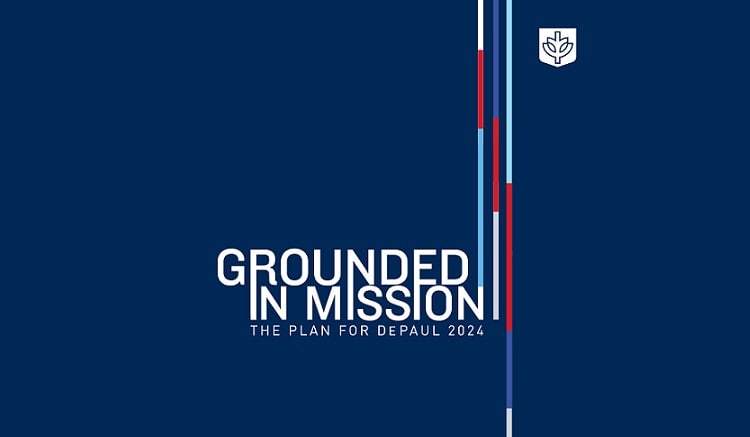
At the midpoint of DePaul's six-year "Grounded in Mission" strategic plan, results are mixed with outcomes slowed by the pandemic. Midpoint metrics are now available on the plan's annual report
website.
High on the accomplishment list are enrollment and philanthropy successes. Enrollment in new programs as a percentage of total enrollment reached 14% by the midpoint, surpassing the final goal of 12%, while DePaul also increased the percentage of freshmen overall who fit one or more "mission" criteria. Fundraising had already hit $181 million of a $200 million goal, and coupled with market growth and the return to principal policy, the university's endowment was within $50 million of its $1 billion milestone on June 30, 2021.
During summer retreats held in July and August, agreement was widespread among deans, vice presidents and senior leaders that DePaul managed the pandemic well, yet some metrics declined or remained static due to constraints COVID-19 imposed.
As students and faculty adjusted to life in quarantine and all of their courses delivered online, retention and graduation rates declined. Moreover, students engaged in fewer conversations with people holding differing political views, and volunteering statistics declined because many sites were not accepting volunteers. Internships and experiential learning experiences were curtailed as well.
Deepen our Commitment to DePaul's Catholic, Vincentian, and Urban Mission
Fr. Guillermo (Memo) Campuzano, C.M., vice president for Mission and Ministry, highlighted progress on the mission goal following approval of the revised mission statement. "We are already in conversation about creating curriculum and supporting faculty and staff in understanding our identity better," he says. A new social justice outreach initiative called "Just DePaul" will complement this education.
"I hope DePaul becomes a central place for issues related to social and environmental justice and sustainability," he says.
Ensure a welcoming, engaging, diverse, and inclusive campus environment
Elizabeth Ortiz, vice president of the Office of Diversity and Equity, says, "DePaul community members seized the moment to take DEI training and education programming because they said, 'I can do more to understand issues of race and inequities.' "
During academic year 2020-21, there was a 400% increase in on-demand trainings and a nearly 550% increase in people participating in the BUILD DEI Certificate Program.
"We are using a sunshine policy" toward the university's diversity, equity and inclusion metrics and progress, according to Ortiz. To further increase transparency, the university will introduce a new, public DEI dashboard this fall, created and implemented by Institutional Research & Market Analytics in cooperation with OIDE and the President's Diversity Advisory Committee.
There is universal agreement that yet more must be done regarding DEI at the university.
Prepare All Students for Global Citizenship and Success
Several initiatives from the Division of Student Affairs address both the diversity and student success goals, said Eugene Zdziarski, vice president for Student Affairs. "We introduced the student convocation at Wintrust Arena to build that sense of community and hosted Blue Demon Week in spring around a basketball game," he says, urging faculty and staff to participate in campus activities because their behavior signals to students our commitment to their success.
Zdziarski also points to Generation Success as an important strategy and says the number of students in the
STARS program doubled last year, with plans in progress to further increase that number. Furthermore, two new staff positions were approved to support the retention and persistence of Black and Latinx students.
Expand access to a portfolio of high-quality, affordable academic programs
Many initiatives are underway to enable more flexibility for students. Provost Salma Ghanem notes that Zoom rooms were planned prior to the pandemic to increase modalities and convenience for students.
Bob McCormick, vice president for Information Services, details the status. "The last two summers, we built out classroom technology to include 58 tri-modal rooms, 76 Zoom rooms and 46 additional technology-enhanced rooms, which means in addition to CDM's Course OnLine capabilities, DePaul has more classrooms with flexible technology than not."
Tatum Thomas, dean of the School of Continuing and Professional Studies, adds that the school is exploring degree completion and non-credit bearing programs "to see what performs well and what needs more support."
Elevate academic excellence and embrace a culture of creativity and discovery
DePaul must continually build a community of high achieving students who can succeed here, and elevate the institution in the eyes of its peers. Student retention is an important benchmark in that effort.
Beyond retention and persistence, other key strategies advancing DePaul closer to its excellence goals are the creation of the Academic Growth and Innovation Fund, Faculty Recruitment Incentive Program and Innovation Day, which showcases and encourages faculty research and creativity.
"Our goal should be to increase value of a DePaul degree every year," Dr. Esteban says.
Employ bold approaches to ensure fiscal strength for future generations
Although fundraising increased, DePaul was unable to reduce its dependency on tuition or increase its net tuition revenue by the plan's midpoint. Yet, two efforts designed to position the university for the future have moved forward: Program Portfolio Review and DePaul Tomorrow Visioning.
Steve Stoute, vice president for Strategic Initiatives, summarizes the next steps that will guide the overall strategy for the final three years of the plan. Deans, vice presidents and senior leaders "looked at the goals we have not started, or those we started and need to renew our effort or adjust our approach," he says.
Joint Council will focus on these items through the plan's conclusion in 2024, in addition to moving the needle on key metrics.
"Compared to many institutions, we did great," Dr. Esteban reflects. "The question is always, 'How can we do better?' We always want to be one step ahead."
Denise Mattson is a special assistant in the Office of the President.